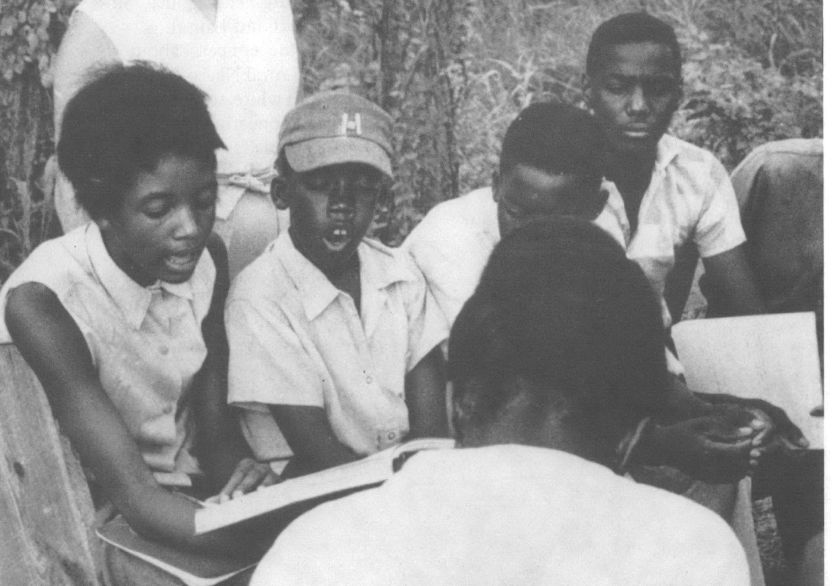Before & after Freedom Summer

A Freedom School class. (State Historical Society of Wisconsin / Southern Exposure)
This year marks the sixtieth anniversary of Freedom Summer, the landmark campaign in Mississippi that saw more than 1,000 college students from around the country descend upon rural Mississippi to register rural Black Mississippians to vote, and which, in the face of extreme state and white supremacist suppression, seeded a broader movement for racial and economic justice. This month, we’re bringing you a selection of Southern Exposure archival content about the movement work leading up to, and the organizing — and suppression — that rose out of Freedom Summer.
Stayed on Freedom, the Spring 1981 issue of Southern Exposure, told the story of organizing in Mississippi before Freedom Summer through the voices of many of those most involved in it, including Ella Baker and Fannie Lou Hamer in “Mississippi Movement.” “[SNCC] tried to work within the system,” Ella Baker recalled. “They tried to go through the channel of voter registration, which ought to have been a very easy road, but they got all kinds of physical reprisals as a result of it. So they were driven more and more into a realization that something different had to take place.”
The June 1964 murders of three civil rights workers “fueled the fires for an intense and diverse struggle for freedom,” as Stayed on Freedom’s editors wrote. Against this backdrop, local organizers and Freedom Summer volunteers set up more than 40 Freedom Schools, spaces where volunteer teachers led Black youth in Mississippi through a curriculum meant to help them question the power structures they lived in, and to develop them into revolutionary leaders. In a 1965 essay on the Freedom Schools, published in Stayed on Freedom, Len Holt wrote:
It was a hot morning in early July when the freedom schools, the temple of questions, opened.
That date — July 7, 1964 — will be cursed by the power structure of Mississippi and celebrated by the lovers of human dignity as the point of the beginning of the end — the end and the downfall of the empire of Mississippi, the political subdivision, the state that exhibits best the worst found anywhere in America.
Poetry by Freedom School students Edith Moore and Mary Zanders also appeared in the issue.
Freedom Summer brought hundreds of young white students to the South, many of them for the first time. In a piece titled “Women’s Consciousness and the Southern Black Movement,” for the 1976 issue Generations: Women in the South, Sara Evans wrote that women’s experiences in the Southern freedom movement helped birth new kinds of feminism. “A critical vanguard of young women accumulated the tools for movement building: a language to describe oppression and justify revolt, experience in the strategy and tactics of organizing, and a beginning sense of themselves collectively as objects of discrimination,” she wrote. Black women and white women occupied different spaces in the movement, however—fractures and differing experiences around the intersections of race and sexuality that began during Freedom Summer and continued into the Black Power and feminist movements.
Freedom Summer, like movement work before and after it, was surveilled by the state and federal government. Through the Mississippi State Sovereignty Commission, a COINTELPRO-type operation which predated COINTELPRO itself by several years, the Mississippi state government surveilled and tried to counteract Mississippi movement organizers, including those involved in Freedom Summer. In a 1981 piece from Southern Exposure titled “Mississippi Spies,” Ashaki Binta interviewed researcher Ken Lawrence, who spent a decade researching the Sovereignty Commission and was a plaintiff in an ACLU lawsuit against it. In the decades since the interview, more information has come out about the state sovereignty commission, including a searchable digital archive of the commission’s files, which were released in the late 1990s, a PBS documentary, and a book by Yasuhir Katagiri.
Tags
Olivia Paschal
Olivia Paschal is the archives editor with Facing South and a Ph.D candidate in history at the University of Virginia. She was a staff reporter with Facing South for two years and spearheaded Poultry and Pandemic, Facing South's year-long investigation into conditions for Southern poultry workers during the COVID-19 pandemic. She also led the Institute's project to digitize the Southern Exposure archive.
